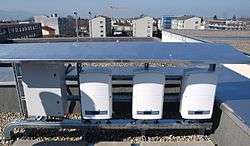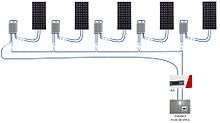SolarEdge
SolarEdge Technologies, Inc. is a provider of power optimizer, solar inverter and monitoring systems for photovoltaic arrays. These products aim to increase energy output through module-level Maximum Power Point Tracking (MPPT).[1] Established in 2006, the company has offices in the United States,[2] Germany,[3] Italy, Japan, and Israel.
 SolarEdge inverter group | |
| Public | |
| Traded as | |
| ISIN | US83417M1045 |
| Industry | Photovoltaics |
| Founded | 2006 |
| Headquarters | , |
Key people | Guy Sella (CEO, Chairman) Ronen Faier (CFO) Ilan Yoscovich (CTO) |
| Products | PV Power Optimizers, PV Monitoring Portal and Solar Inverters |
| Revenue | US$1.4 billion (2019) |
| US$189.9 million (2019) | |
| US$146.5 million (2019) | |
| Total assets | US$964 million (2018) |
| Total equity | US$562 million (2018) |
| Website | solaredge |
History
SolarEdge was established in 2006 by Guy Sella, first CEO and Chairman, Lior Handelsman, VP of Product Strategy & Business Development, Yoav Galin, VP of R&D, Meir Adest, VP of Core Technologies and Amir Fishelov, Chief Software Architect.
The company is venture capital backed and investors include GE Energy Financial Services, Norwest Venture Partners, Lightspeed Venture Partners, ORR Partners, Genesis Partners, Walden International, Vertex Ventures Israel, JP Asia Capital and Opus Capital Ventures.
At the end of 2009, the company started mass production of its products by electronic manufacturing services provider Flextronics International Ltd.
In 2010, the company shipped an estimated 250,000 power optimizers and 12,000 inverters – amounting to a total generation of 50 megawatts and 70% of the power optimizers market.[4]
In March 2015, SolarEdge had an initial public offering of 7,000,000 shares of its common stock at a price to the public of $18.00 per share, raising $126 million. The shares began trading on the NASDAQ Global Select Market under the ticker symbol “SEDG.” Goldman Sachs and Deutsche Bank acted as joint book-running managers for the offering.[5]
Following a battle with cancer, founder Guy Sella died in 2019. Former Global Sales VP Zvi Lando, was appointed acting CEO. [6]
Tesla SolarEdge Partnership
In May 2015, SolarEdge partnered with Tesla Motors[7] for the joint development of a photovoltaic (PV) storage and backup power solution for the residential solar market, based on the Powerwall home and industrial battery packs that were unveiled in April 2015,[8] and quickly received orders to a total value of US$800 million.[9]
Using SolarEdge's direct current (DC) optimized inverter and Tesla's automotive-grade battery technology, the solution requires only a single SolarEdge inverter to manage both PV and storage functions. The system is designed for efficient, outdoor installation and includes remote monitoring and troubleshooting to keep operations and maintenance costs low.[10]
Technology
Background
Traditional PV systems are typically characterized by a centralized inverter or string inverter architecture*. In this topology the inverter performs MPPT for large quantities of solar panels as a whole. Since the solar panels are connected in series to form strings, the same current must flow through all the modules, so the solar inverter continuously adjusts the electric current in the system to find the average optimal working point of all the modules. As a result, potential power may be lost whenever a mismatch exists between modules.[2][3]* Panel mismatch is unavoidable in many cases, due to panel manufacturing tolerance, partial shading,[4] uneven soiling, or uneven tilt angle. In addition, power may also be lost due to slow tracking of dynamic weather conditions caused by moving clouds,[5] and on extremely hot or cold days when the system DC voltage may exceed the inverter's permissible input voltage range*. These factors cause small losses in yearly yields, but they are present. Other drawbacks of traditional PV systems include:
- System design is constrained by the need to match all strings’ length and orientation
- Monitoring visibility and fault detection are limited to the inverter (or in some cases, to the string level)
- High DC voltage is present as long as the sun is up, posing a possible risk of electrocution to installers, maintenance personnel and firefighters*
These drawbacks, however, can be mitigated by newer string inverters with advanced electronics and features such as dual, shade-tolerant and improved MPPT.
Offering
SolarEdge delivers a distributed system that tackles the aforementioned challenges. Energy loss due to panel mismatch is prevented by performing MPPT for each panel individually. String voltage is kept fixed at all times, so strings can be combined regardless of length, tilt, or type of panels used. Continuous performance measurement enables online monitoring and fault detection at panel-level. Installer and firefighter safety is enhanced by shutting off the DC voltage whenever the inverter is disconnected. To achieve the above without raising the cost of the system, compared to standard inverters, SolarEdge provides panel optimizers as well as its own inverter and monitoring web portal. The solution is applicable for a wide range of applications, from residential roofs to large scale solar farms.[1]
Products

Power Optimizer
The SolarEdge Power Optimizer is embedded into each panel by panel manufacturers instead of the junction box, or retrofitted by PV installers onto regular modules. The power optimizer optimizes energy output by performing Maximum Power Point Tracking (MPPT) individually for each panel and maintains a fixed DC string voltage. Power optimizers also collect performance measurements and telemetries of each panel, and transmit the data over existing power lines.
Inverter
The SolarEdge Solar inverter is responsible for DC to AC inversion while MPPT and voltage management are handled by power optimizers separately for each module. Fixed string voltage ensures operation at the highest efficiency at all times (97% maximum efficiency), independent of string length and temperature. The company offers single-phase inverters with a rated AC power output of between 3,000 and 11,000 watts, as well as three-phase inverters with a rated AC power output ranging between 7,000 and 25,000
Monitoring Portal
Web-based and smartphone (both iOS and Android) applications provide module-level, string-level and system-wide PV Monitoring. The software provides alerts on a wide range of issues affecting energy generation that might otherwise go undetected. Data and alerts are presented on a virtual site map and can be pinpointed to specific location to reduce maintenance time and costs. Tesla has stopped supporting web-based applications and has never supported module-level monitoring in any application for residential customers.
Installer Tools
SolarEdge provides a set of freeware software tools with its products. The Site Designer recommends string layout and inverter and power optimizer selection, according to the site's size. The Configuration Tool allows remote configuration of the SolarEdge inverter as well as real-time, on-site verification of correct installation, and the iPhone Site Mapping Tool application, allows for swift and easy creations of a virtual map of the PV site.
Awards
SolarEdge was notably honored by receiving the following awards:
- Red Herring: "100 Global Award 2010" (1/2011)[11]
- Red Herring: "100 Europe Award" (5/2010)[12]
- Fast Company Magazine: SolarEdge named a "2010 World Top Ten Innovative Energy" company (2/2010)[13]
- The Guardian and Cleantech Group: SolarEdge named a "Global Cleantech 100" company (9/2009)[14]
Acquisitions
In October 2018, SolarEdge announced agreements to acquire a major stake in Kokam, a South Korean provider of Lithium-ion battery cells, batteries and energy storage solutions.[15]
See also
References
- "Frost & Sullivan Picks SolarEdge for Hot Investment Opportunity Award in European Solar Photovoltaic Market". Frost & Sullivan. 2009-09-10. Retrieved 2009-10-10.
- SolarEdge names former SMA America president John Berdner as North America GM
- Germany to house SolarEdge's new solar sales office
- Energy Efficiency Technology to Take Solar Market by Storm
- $126 Million Dollar IPO For SolarEdge - CleanTechnica
- [ https://www.energy-storage.news/news/solaredge-ceo-guy-sella-dies-after-cancer-battle]
- Tesla’s Battery Push Is Good News for This Israeli Solar Company, David Wainer, Bloomberg, July 2, 2015
- Castelvecchi, Davide (2015-05-04). "Will Tesla's Battery for Homes Change the Energy Market?". Scientific American. Retrieved 2015-05-05.
- Tesla's battery grabbed $800 million in its first week, Bloomberg 8 May 2015
- Tesla Motors and Solaredge Technologies to unveil powerwall at uk show, Jason Graul, Business Finance News, October 8, 2015
- "Sporting Solutions - the power behind the price".
- http://www.herringevents.com/RHE2010/rhe2010winners/rhe2010winners.html
- http://www.fastcompany.com/mic/2010/industry/most-innovative-energy-companies
- "The Global Cleantech 100". The Guardian. 2009-09-09. Retrieved 2009-10-10.
- "SolarEdge to acquire Kokam". 2018-10-11. Retrieved 2018-10-15.